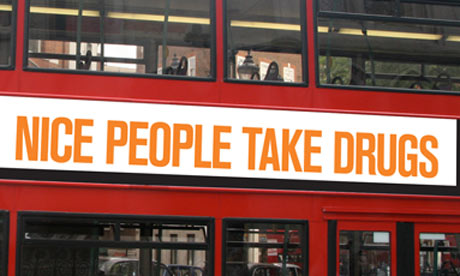One in three adults in the UK have taken them, as have the last three US presidents, so it's time to remove the stigma around drugs, and talk openly towards more effective, safer policy

The Nice People Take Drugs ad campaign for drugs policy reform. Photograph: Release
Nice People Take Drugs – it's not a controversial statement. We all know people who have. The last three US presidents have admitted to it. Much has been suggested about the likely next UK prime minister. Nowadays if a politician admitted to it, the tabloids would struggle to make a story stick let alone generate a scandal. The fact is, a lot of people from all walks of life have at some point taken drugs and it's time we got real about it.
That's why this week we have launched a new campaign called Nice People Take Drugs. Buses will be travelling across London carrying this slogan in an attempt to get people talking about drugs and kickstart a drug policy debate.
Over one third of the adult population of England and Wales has used illegal drugs and almost 10 million people have smoked cannabis. According to the European Monitoring Centre for Drugs and Drug Addiction, one in eight Britons under 35 has taken cocaine. Some will have experimented with drugs with little apparent consequence, some will continue to use them on occasions.
The situation where people have to deny, hide or, if found out, regret their drug taking is simply absurd. The public is tired of the artificial representation of drugs in society, which is not truthful about the fact that all sorts of people use drugs. If we are to have a fair and effective drug policy, it must be premised on this reality.
It is time for the public to challenge the mantra adhered to by politicians and much of the media that society must continue to fight a war on drugs, as if they are an enemy worth fighting and ones that can be defeated. The implication that drugs are evil and that users of them ought to be made to feel ashamed suits this status quo, but in fact does not reflect most people's experience of drugs.
We all know that, for a minority, drugs and alcohol can have disastrous consequences – but ones that are only exacerbated by the current laws and are better addressed with robust and comprehensive public health campaigns.
Aside from the occasional tinkering with the outdated classification system, drugs and drug policy do not get properly discussed and politicians are afraid to debate the possibility of meaningful reform.
The government is reluctant to tackle the subject firstly because of the culture of fear of drugs that is used as justification for the zero-tolerance approach, and also due to politicians' uncertainty about how to make the transition from failed to improved drug policies.
The Nice People Take Drugs campaign is needed so that the public can give politicians the confidence that they need to abandon the ridiculous 'tough on drugs' stance and instead focus on finding real and effective ways to properly control drugs and manage drug use. This would make drugs much less dangerous and, critically, less available to children.
The current system has brought us powerful drugs like crack cocaine, skunk and methamphetamine; it has ravaged countries from Afghanistan to Colombia and has cost billions in a war on people who use drugs. Governments have next to no control over drugs and they are arguably more available and cheaper than ever before. In the UK it is often far easier for a 14-year-old to get cannabis than alcohol.
Breaking the taboo on drugs is the first step to reducing the harm that they can cause. By far the greatest risk to the majority of people who use drugs is criminalisation and stigmatisation. To simply ban substances and arrest those who use them is no more than a complete abdication of policy makers' responsibility to protect the health and well being of its people.
We must start a debate about the kind of drug policy that this country wants to see. The UK does not want drug laws that benefit massive drug cartels and are politically convenient for politicians, but ones that deal effectively and maturely with drugs and make our society a safer place for our children.
